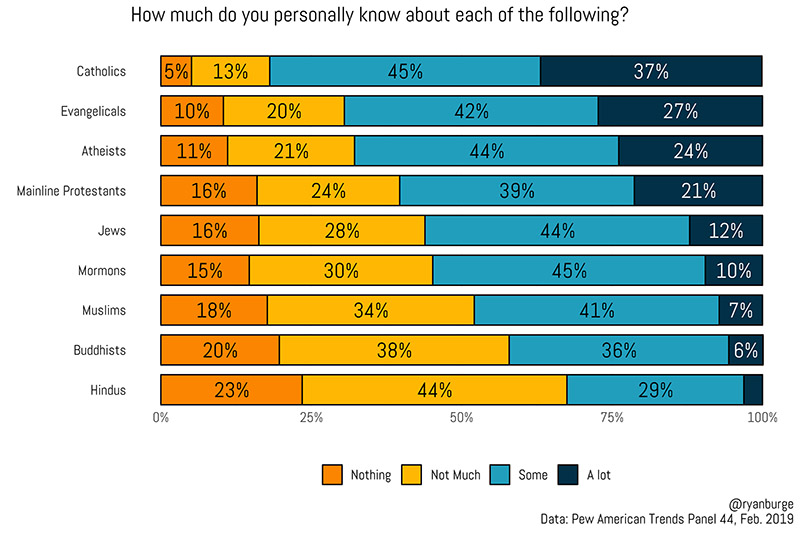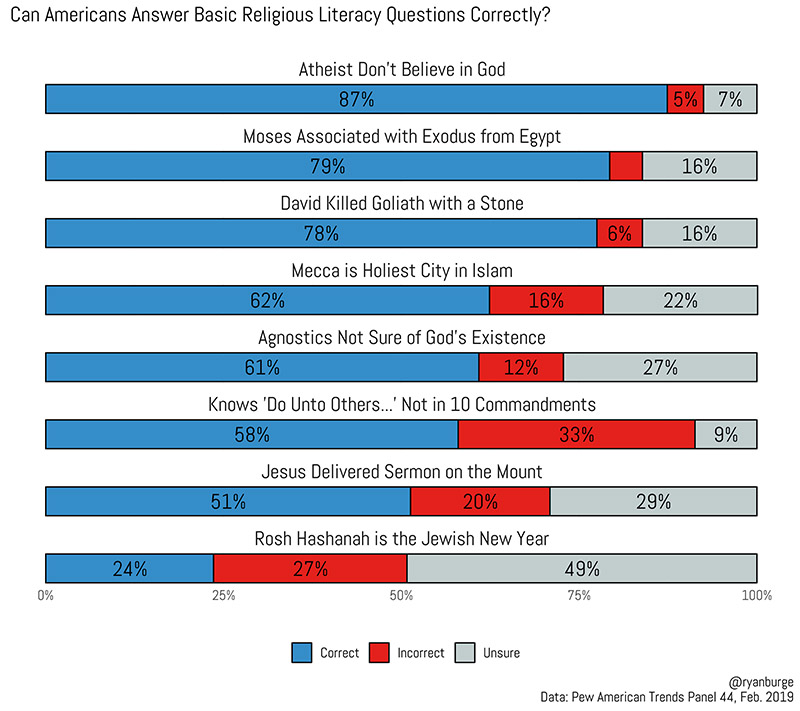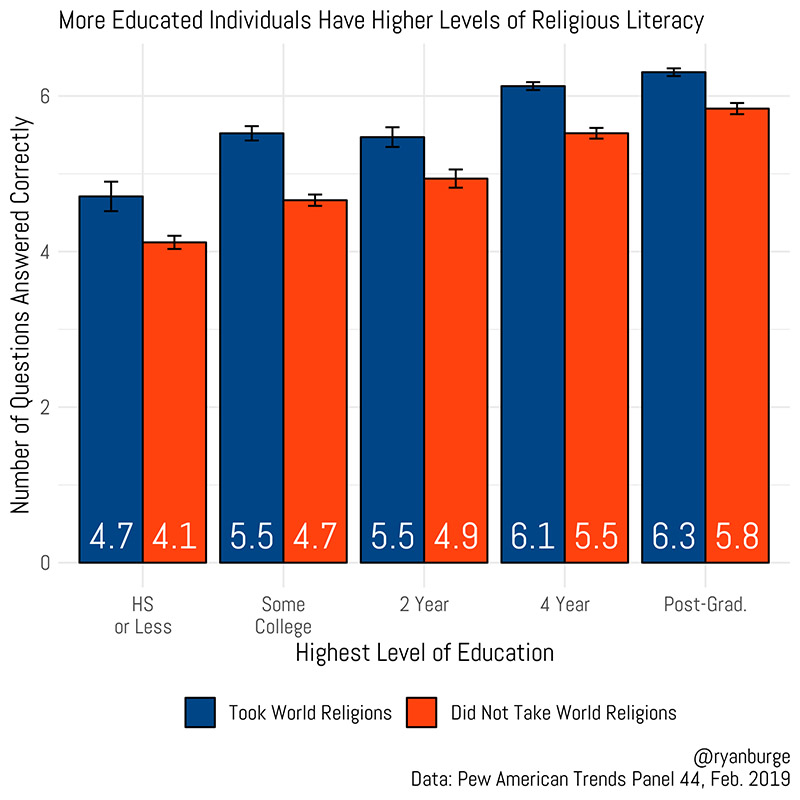(RNS) — A single of the definitely exceptional attributes of the United States is its unbelievably various religious landscape. A county or region dominated by a one religious team is the exception, not the rule. Students have pointed to this religious levels of competition as a single of the factors religion is nonetheless fairly strong in the U.S. in comparison with other industrialized societies, this kind of as Western Europe.
It would behoove these of us residing in the United States, then, to have a good working knowledge of religion traditions outside of our very own. But our religious diversity usually arrives at a value: intolerance and infighting, often driven by mutual ignorance. As the author Andrew Smith at the time wrote, “People dread what they do not realize.”
There is also a gap concerning Americans’ assurance in their grasp of the nuances of other religious traditions and their real religious literacy, according to data from the Pew Research Center posted by the Association of Religion Facts Archives.
Pew requested men and women to assess their level of understanding about a wide variety of faith traditions, from various kinds of Christians (evangelical and mainline Protestants, Catholics and Mormons) to faith groups that make up a scaled-down part of the inhabitants, these as Jews, Muslims and Buddhists.
People, it turns out, feel they have a very good thought of their neighbors’ faiths.

“How much do you individually know about each of the pursuing?” Graphic by Ryan Burge
Supplied the ubiquitousness of Catholicism in the United States, it need to occur as no shock that 82% of respondents said that they knew “some” or “a lot” about the Catholic Church. Respondents also expressed familiarity with Protestantism. It’s notable that 68% expressed a robust familiarity with atheism, given that atheists make up much less than 10% of the United States.
The faith groups that were being fewer recognized are, unsurprisingly, types that comprise the smallest parts of American religion right now. Far more than 50 percent of respondents mentioned that they realized “nothing” or “not much” about the techniques or beliefs of Muslims, Buddhists and Hindus, and fewer than 1 in 10 said they realized a good deal about individuals faith traditions.
Familiarity, then, appears to be to be relevant to exposure to the religion in issue.
But perception of awareness and genuine understanding are two unique principles, fully. The Pew American Tendencies Panel also bundled a spiritual literacy battery that consisted of eight concerns about distinctive religion traditions discovered in the United States. These questions were supplied in various-preference structure — with a few probable solutions detailed. But they also authorized respondents to say they had been not sure of the right remedy.

“Can Individuals Respond to Primary Religious Literacy Inquiries Appropriately?” Graphic by Ryan Burge
The one particular problem that the overpowering variety of respondents understood the appropriate solution to is “What is an atheist?” Virtually 9 in 10 respondents accurately indicated that atheists are “someone who does not consider in God.” But powerful majorities have been also able to affiliate Moses with the Exodus and realized that David killed Goliath, both tales from the Aged Testament.
Spiritual literacy prices dropped noticeably from that place. Just 62% of individuals realized that Mecca is the holiest metropolis in Islam just about the exact number could accurately describe the beliefs of agnostics. The 10 Commandments and the Sermon on Mount also appeared to stump a lot of respondents, even even though huge majorities are informed of who Moses was.
When provided a listing of three achievable commandments, a 3rd of men and women incorrectly considered that “Do unto other individuals as you would have them do unto you” was portion of the Decalogue. A bare the greater part the right way answered the dilemma “According to the Christian Gospels, who delivered the Sermon on the Mount?”
The concern that obviously caused the most problems involved Rosh Hashanah and its meaning for people of the Jewish religion. Nearly 50 percent of the sample refused to respond to the issue.
Presented these blind places, it is really worth asking which factors amplified religious literacy amid the respondents. To exam that, an additive scale was manufactured, having in all responses to the issues in the battery, with scores ranging from zero thoughts accurate to all eight inquiries answered properly. The study also questioned respondents about their level of educational attainment and whether they experienced taken a environment religions course in high faculty or higher education.

“More Educated People today Have Bigger Levels of Religious Literacy” Graphic by Ryan Burge
Individuals with increased ranges of academic attainment answered additional of the concerns properly — little shock there. Amid people with a higher university diploma or a lot less, the necessarily mean score was about 4 questions out of eight. Amongst those people who had accomplished a four-calendar year college diploma, the suggest score was about six thoughts accurately answered.
What’s noteworthy, on the other hand, is how significantly getting a entire world religions course aided with religious literacy. At every single stage of academic attainment, a man or woman who took globe religions classes scored about 50 % a issue better than individuals who did not choose a environment religions class. This is distinct and measurable evidence that these programs have a long-term effects on understanding about faith traditions.
An regular score of four out of 8 queries answered effectively is commendable for an individual who has had number of encounters with other faiths, as quite a few People have not. But the nation is if nearly anything getting to be additional religiously numerous — and, famously, far more politically polarized. Zeenat Rahman, government director of the University of Chicago Institute of Politics, has argued that greater spiritual literacy could direct to a reduce in polarization. It is guaranteed to occur in useful for individuals of us who envision we know and welcome our neighbors.